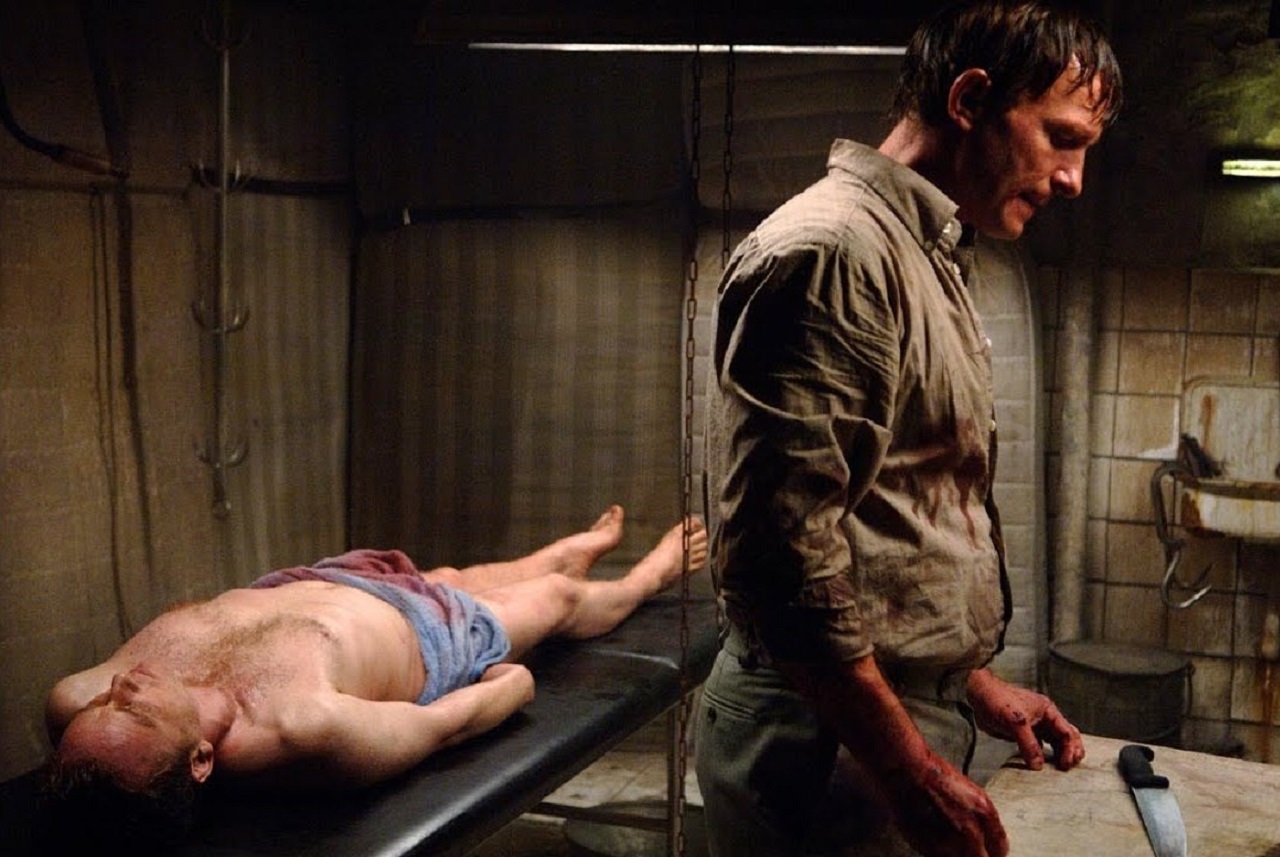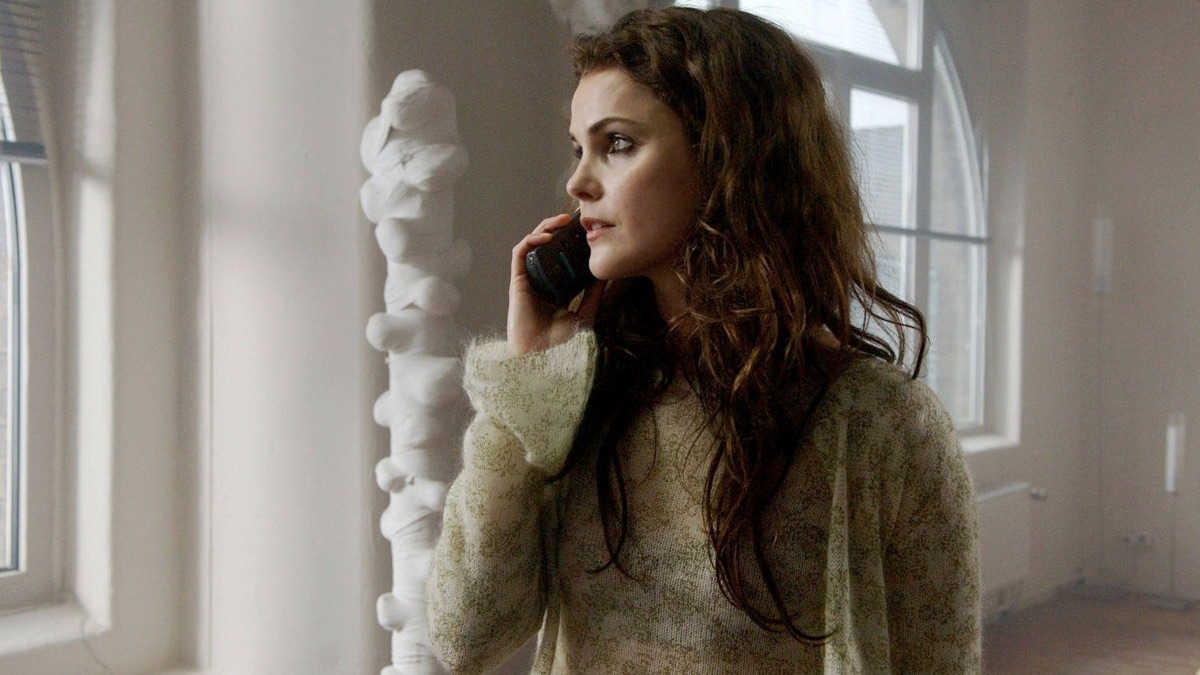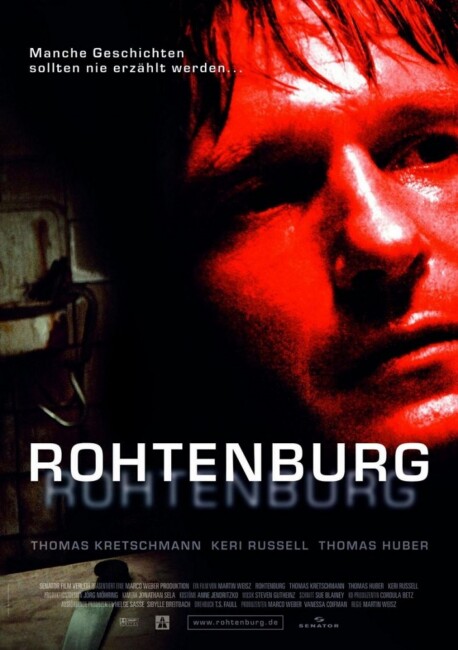aka Butterfly: A Grimm Love Story; Grimm Love
Crew
Director – Martin Weisz, Screenplay – T.S. Faull, Producers – Vanessa Coifman, Andrew Schmid & Marco Weber, Photography – Jonathan Sela, Music – Steven Sutheinz, Visual Effects – Gorilla Digital (Supervisor – Oskar Weisz), Special Effects – CFX Spezialeffekte, Makeup Effects – Tamar Aviv & Joern Seifert, Production Design – Joerg Moehring. Production Company – Lightning Entertainment/Autobahn.
Cast
Thomas Kretschmann (Oliver Hartwin), Keri Russell (Katie Armstrong), Thomas Huber (Simon Grombeck), Marcus Lucas (Felix Schneider), Rainier Meissner (Young Oliver), Angelika Bartsch (Viktoria)
Plot
American student Katie Armstrong becomes fascinated with the story of the German cannibal Oliver Hartwin who made a pact with Simon Grombeck to eat his flesh. She travels to Germany to write a thesis on Hartwin and Grombeck. As Katie delves into the two men’s pasts, she uncovers how both were deeply lonely as a result of their respective childhoods. Both met on an internet bulletin board after Simon responded to Oliver’s posting, seeking someone to devour. In this, Simon saw that he could fulfil a lifelong fantasy of having his penis bitten off and his flesh devoured by another. The two finally met to put the fantasy into action.
Rohtenburg, usually better known under its English-language retitling Grimm Love, is a film based on the true-life story of the German cannibal Armin Meiwes and his victim Bernd Jürgen Brandes. The two met from an internet bulletin board in 2001, where by mutual agreement Meiwes severed Brandes’s penis and the two men attempted to eat it, before Brandes expired. Meiwes then carved Brandes’s dead body up, placing it in the freezer and eating most of it over the next year. Meiwes was arrested when he posted another ad on the bulletin board and police were alerted by a concerned user. Meiwes’s defence was that he did not conduct murder as Brandes has given permission to be killed. He was nevertheless sentenced to life imprisonment in 2004. The Armin Meiwes story has also fuelled a number of other films, including German-made efforts like Your Heart in My Head (2005), Cannibal (2006) and Ulli Lommel’s US-made Cannibal/Diary of a Cannibal (2006), while a scene directly referencing the incident can be found in the otherwise unrelated Feed (2005).
Rohtenburg/Grimm Love has clearly made for English-language rather than German audiences – the actors speak in English, while the email exchanges and the phrases that get written on body parts are all in English. (The idea of a German-made film about a German incident all taking place in English must surely have led to some peculiar cultural identity confusions during shooting. Mindedly, German audiences never got to see Rohtenburg, which ended up being banned in Germany after Meiwes sued, claiming that people had no right to make a film about his life without his permission. The ban was successful, although was later revoked in 2009). The English-language retitlings, Grimm Love and Butterfly: A Grimm Love Story, are also contrived – the phrase Grimm Love is unrelated to anything else in the film, except for one line where it is said they are close to a forest location of the Grimm Brothers, while there is nothing at all in the film about butterflies.
The filmmakers have also brought in US actress Keri Russell to carry the film rather than rely on the moderately well internationally known German actor Thomas Kretschmann or fascination with the crime itself to sell the film. Keri Russell’s presence tends to give the story a distracting double layer – the emphasis ends up being placed on her investigating the cannibal story for a thesis, rather than where the real interest lies, which is surely in the psychological headspace of the cannibal and his victim, not Keri’s student. To be fair, Russell does okay with the role, it allowing her a darker edge than the usual light fluff like tv’s Felicity (1998-2002) she was known for. You cannot help but feel that a more straightforward telling without the narrative wraparound would have helped Rohtenburg/Grimm Love to no end.

The film makes an effort to explain the psychological motivation of both Meiwes and Brandes. There are lengthy alternating flashbacks to either’s childhoods during the first half. The film’s thesis is that Meiwes was driven to eat Brandes and Brandes desired to be eaten as a result of loneliness. This is a fair argument that would seem to be supported by psychological studies on Meiwes. However, the way the film applies it is reductionist – ‘loneliness’ is used as a blanket explanation that is supposed to cover everything. There are a great many people in the world who feel lonely but don’t feel the need to eat others or be devoured. What one would suggest is missing in the film’s psychological equation is an element of pathological sexual fetishism. “Loneliness drove them both to it” seems a too pat an explanation all on its own.
The first half of the film is slow moving and uneventful. In order to spike interest, director Martin Weisz has to provide contrived shocks like crosscutting Keri Russell’s foot going through a step as she goes down into the cellar with a series of strobe flashes as Thomas Kretschmann finds his dead mother’s body floating in the cellar, two events that are not in any way connected excepting in the unnatural desire to fabricate a shock at that particular point in the film.
The film does eventually develop a perverse kick during the second half – such as during some of the emails with Thomas Kretschmann referring to Thomas Huber in blunt terms like ‘flesh’ and ‘meat’ or exchanges like: “Do you still want to go through with it?” “There is no way back. Only forward. Through your teeth.” The film gets noticeably grimm when it gets to scenes of Thomas Kretschmann with an anonymous victim bound and wrapped in cellophane where he outlines the choice pieces of leg and rump to eat with a marker pen and then starts preparing to winch the man up with a chain, before the man starts crying out that he doesn’t want to go through with it. Thomas Kretschmann gives an appropriately cold and detached performance as the Meiwes equivalent.

Rohtenburg/Grimm Love gains its effect during the scenes where the two men meet and the eating begins. The film is particular bleak during the scenes of Thomas Kretschmann severing Thomas Huber’s penis and of a bleeding Huber collapsing at the table in the foreground while Kretschmann stands in the background cooking the penis in a frying pan. It is here that Martin Weisz does reach the film’s potential and take us inside some equivalent of what happened.
The disappointing coda to the film is where Keri Russell finishes watching the videotape of the event and is so disgusted that she destroys it. Firstly, it is hard to believe that she could so easily access a copy of the videotape just by going and advertising on bulletin boards. (If the tape is that readily available, why wouldn’t copies be all over the peer-to-peer networks?). It is also hard to believe that someone so obsessed with the case that she travelled all around the world and delved into the cannibal underground, when faced with evidence of it, would react with revulsion rather than studious fascination.
Martin Weisz, previously a music video director, received some international acclaim as a result of Rohtenburg/Grimm Love playing at various festivals and was brought to the US by Wes Craven to direct The Hills Have Eyes II (2007). Weisz did not make another film again until the US-made Squatters (2014).


